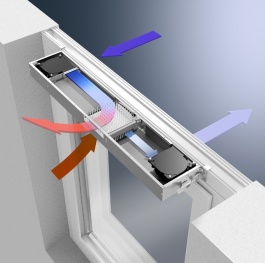
Heavily insulated buildings need to be well-ventilated, but this is often forgotten
 |
| Integrated window ventilation system Schüco VentoTherm with air recovery, filter, and automated control. |
Currently, according to the chamber, high energy standards for buildings are prioritized, mainly focusing on energy savings for heating and ventilation. This involves improving the thermal technical properties of the building structure and sealing the building, as well as window openings.
"Construction companies want to obtain contracts for insulation, insulate the building, replace the windows, and then leave people to their fate without informing them about the problems that may arise," said authorized engineer and energy specialist Jaroslav Šafránek to ČTK.
Ventilation is energy-intensive, and the choice of ventilation system is individual. However, people can choose between natural ventilation, hybrid (a combination of forced and natural ventilation), and forced ventilation with recovery or air conditioning. According to ČKAIT, a residential building in the city center will have different requirements than a family house in the countryside.
"If people do not realize that they need to set a different ventilation regime, it leads to condensation and mold. These are the most basic aspects affected by the energy reconstruction of the building," Šafránek stated.
A family of four produces up to 10 kilograms of moisture daily, which needs to be ventilated. If mold develops, it can not only irritate but also be toxic and carcinogenic. An increasing concentration of carbon dioxide is also a problem. It is commonly found in sealed apartments and school buildings.
The State Environmental Fund will begin accepting electronic applications for subsidies from May 15. The program offers subsidies for energy savings and insulation for family houses throughout the republic. For the first time in five years, it will also be available for Prague apartment buildings. About 1.1 billion crowns can be utilized, of which 600 million should go to family houses and half a billion to "apartment buildings". According to Šafránek, there is little money this year compared to previous years, and funding for apartment buildings may be quickly exhausted.
The English translation is powered by AI tool. Switch to Czech to view the original text source.
0 comments
add comment









